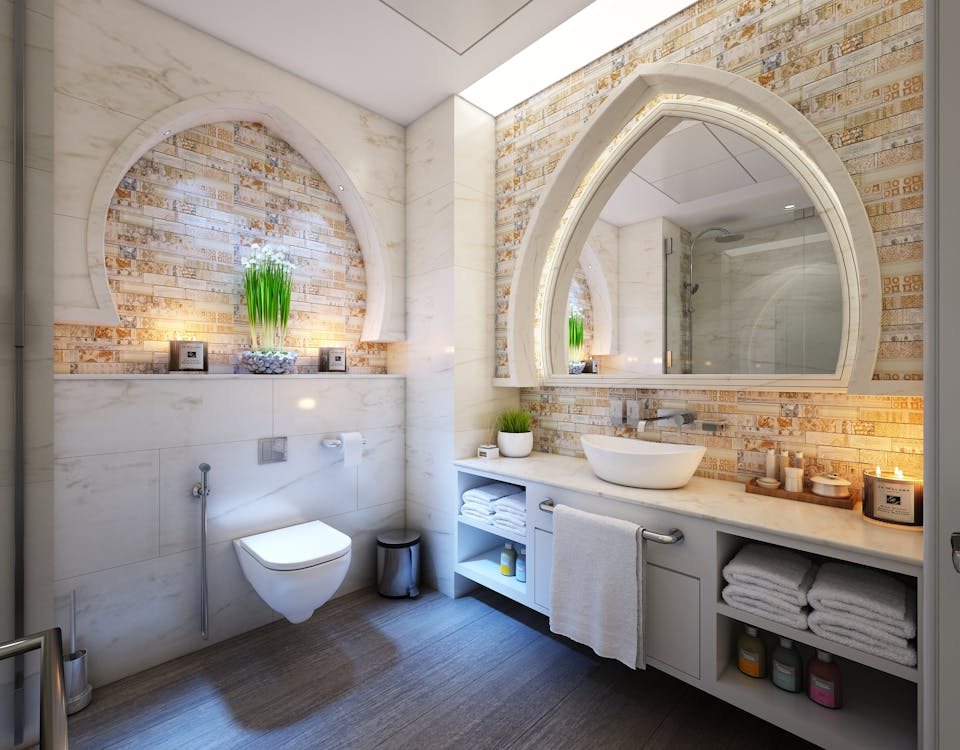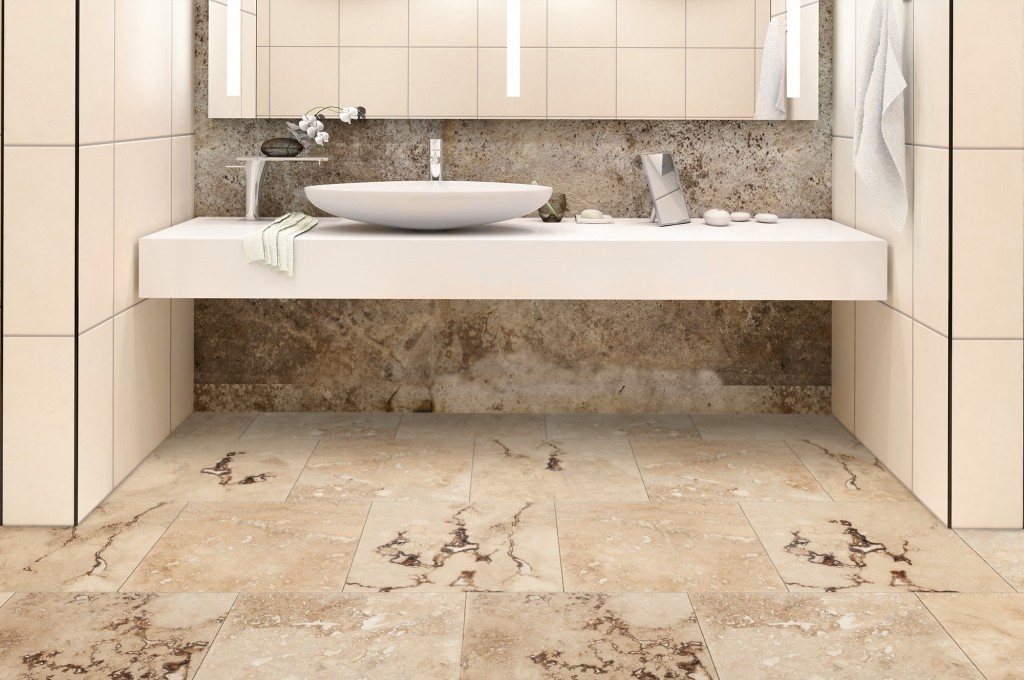Ah, the bathroom, a sanctuary where we seek solace, rejuvenation, and perhaps even our best thinking moments. Your bathroom, a space of daily rituals and tranquil retreats, deserves a floor that can withstand the challenges of moisture while still providing an aesthetically pleasing backdrop. However, when choosing the best flooring for a bathroom, you will face a dizzying array of options. Should you go for practicality, luxury, or something in between?
Whether you’re dreaming of a high-end retreat, seeking a budget-friendly alternative, or aiming to balance cost and quality, we’ve got you covered. We’ll help you navigate the maze of bathroom floor choices and help you discover the best bathroom flooring solution to transform your bathroom into a true oasis.
What are the Bathroom Flooring Options?
By understanding the details of each bathroom flooring type, you can make a knowledgeable decision that meets your specific needs and enhances your bathroom’s overall design. Below are some of the best bathroom flooring options:
1. High-End Option: Ceramic and Porcelain Tiles
Image Credit: pinterest.com
Ceramic and porcelain tiles are widely regarded as the high-end choice for bathroom flooring. They are manufactured with a protective glaze that makes the floor under them impervious to water and highly suitable for wet environments.
Here are some key reasons why ceramic or porcelain tile is a top bathroom flooring option:
- Water resistance: Ceramic and porcelain tiles are naturally water-resistant, making them highly suitable for bathroom environments.
- Durability: These tiles are known for withstanding heavy foot traffic and frequent bathroom cleaning without losing quality.
- Design versatility: They offer various tile colors, patterns, and sizes, allowing for endless design possibilities in bathroom decor.
- Easy maintenance: Tiles are relatively easy to clean and require minimal upkeep, making them a practical choice for busy bathrooms.
However, there are cons to keep in mind:
- Cold and hard surface: The ceramic tile can be cold underfoot, especially in colder climates. Using radiant heating systems or incorporating bath mats can help mitigate this issue.
- Grout lines: The grout lines between tiles need regular cleaning and sealing to avoid staining and the growth of mold and mildew.
2. Mid-Range Option: Vinyl Flooring
Vinyl flooring is among the best waterproof flooring options for bathrooms. It is made of synthetic materials naturally resistant to water, making it highly suitable for wet areas. Vinyl flooring comes in various forms, including luxury vinyl planks (LVP) and luxury vinyl tiles (LVT).
Image Credit: tileideaz.com
This bathroom flooring choice can imitate the appearance of natural materials like wood or stone. Here are some advantages of using vinyl flooring in bathrooms:
- Water resistance: Vinyl flooring is inherently water-resistant, making it an ideal bathroom choice.
- Comfort underfoot: Its softer surface provides a more cushioned feel than ceramic or porcelain tiles.
- Wide range of designs: The flooring comes in various styles, including options that mimic the appearance of natural materials like wood or stone.
- Easy installation: It’s easy and often available as adhesive-backed tiles or interlocking planks.
However, there are several cons to consider:
- Vulnerability to sharp objects: This flooring can be vulnerable to damage from sharp objects, such as dropped knives or heavy furniture. Care should be taken to prevent scratching or puncturing the surface.
- Fading and discoloration: Over time, exposure to sunlight can cause certain types of vinyl sheet flooring to fade or change color. Choosing UV-resistant options can help mitigate this issue.
3. Budget-Friendly Option: Laminate Flooring
Laminate flooring is a cost-effective alternative that can take after more expensive materials like hardwood or stone. Like vinyl flooring, waterproof laminate can mimic the look of natural materials.
Below are the advantages of laminate bathroom flooring:
- Moisture resistance: Laminate flooring with a moisture-resistant core and properly sealed edges can withstand occasional water spills in bathrooms.
- Affordability: Laminate flooring offers a budget-friendly option that does not compromise aesthetics.
- Easy installation: Designed for easy installation, laminate flooring often utilizes a click-lock system that does not require adhesives.
However, there are a few considerations with laminate flooring:
- Vulnerability to standing water: While laminate flooring can handle occasional water spills, wiping up any standing water is important to prevent damage promptly.
- Durability: While laminate flooring is generally extremely durable, it may not withstand heavy impacts or wear, as well as ceramic or porcelain tiles.
4. Luxurious Option: Natural Stone Flooring
For those seeking a luxurious and timeless look, natural stone flooring options such as marble, granite, or limestone can add elegance to any bathroom design.
Image Credit: tastefulspace.com
Here are some advantages of using natural stone tile flooring in bathrooms:
- Elegance and beauty: Natural stone provides a sophisticated and high-end aesthetic, adding a touch of luxury to any bathroom design.
- Exceptional durability: Stone is incredibly durable and can withstand foot traffic and daily wear and tear.
- Moisture resistance: When properly sealed, the natural stone tile can be highly resistant to water, making it suitable for bathroom use.
- Unique patterns: Each piece of natural stone is unique, offering a one-of-a-kind look with intricate patterns and color variations.
However, there are cons to keep in mind:
- Higher cost: Natural stone is typically more expensive than other flooring options, requiring a higher upfront investment.
- Regular maintenance: Natural stone requires regular sealing to maintain water resistance and protect it from stains and etching. It may also require periodic resealing to maintain its beauty.
- Susceptibility to damage: Some types of natural stone, such as marble, are softer and more prone to scratching and etching. Care must be taken to avoid using abrasive cleaners that can damage the surface.
5. Allergen-Friendly Option: Hardwood floors
While hardwood flooring is a common choice for many home areas, it is generally not the best bathroom flooring due to its susceptibility to moisture damage.
However, if you are set on having hardwood flooring in your powder room or bathroom, there are a few things to consider:
a). Use Engineered Hardwood
Image Credit: forbes.com
Engineered wood is a more suitable option for bathrooms compared to solid wood. It is made with layered construction, a real hardwood veneer layer and a moisture-resistant core beneath. Engineered wood provides better stability and resistance to moisture, making it less prone to warping or swelling. However, choosing engineered wood flooring specifically designed for bathrooms is important, with proper sealing and finishing.
b). Strict Maintenance
If you choose hardwood for your bathroom, you must be attentive to maintenance. Wipe up any water spills immediately and ensure the bathroom floor is properly dried after each use. Use bath mats or rugs near the shower or tub to minimize water exposure to the hardwood. Regularly inspect the wood flooring for any signs of moisture damage or wear, and address any issues promptly.
c). Controlled Humidity
Maintaining proper humidity levels in your bathroom is crucial to minimize the risk of damage to hardwood flooring. Use exhaust fans or open your windows to ventilate the bathroom and reduce humidity. Avoid excessive moisture buildup by promptly repairing any leaks or plumbing issues.
The advantages of hardwood flooring for bathrooms include the following:
- Aesthetic Appeal: This bathroom flooring adds warmth, elegance, and natural beauty to any space, including bathrooms. It can create a luxurious and timeless look that enhances the overall design and ambiance of the bathroom.
- Comfort and Warmth: Hardwood bathroom flooring provides a comfortable and inviting surface. It can feel warmer underfoot compared to other water-resistant flooring options, such as tiles or stone.
- Increased Home Value: It’s highly desirable and can increase the resale value of your home. It is a common choice among homeowners and can attract potential buyers.
Image Credit: bestatflooring.co.uk
Below are some disadvantages of hardwood flooring for bathrooms:
- Water Damage: Bathrooms are high-moisture environments, and excessive exposure to water can damage hardwood flooring. Wood is naturally porous and can absorb moisture, leading to warping, swelling, and cupping. This can compromise the integrity and appearance of the bathroom flooring.
- Maintenance and Care: Hardwood flooring in bathrooms requires thorough maintenance and care. Regularly wiping up water spills, ensuring the bathroom floor is properly dried after each use, and using bath mats or rugs to minimize water exposure are essential. Additionally, the wood flooring may need to be resealed periodically to maintain water resistance.
- Limited Moisture Resistance: Even with proper maintenance, it’s not the best waterproof flooring for bathrooms since it’s not as moisture-resistant as other options for wet environments. The risk of water damage and potential issues, such as mold and mildew growth, is higher with hardwood flooring.
- Cost and Installation: Hardwood flooring is generally more costly than other flooring options, and the cost can increase if you choose engineered hardwood specifically designed for bathrooms. Additionally, professional installation is often recommended, adding to the overall cost.
- Limited Design Options: Hardwood flooring is available in various wood species and finishes. However, the range of design options may be more limited than materials like ceramic or porcelain tiles or natural stone. Additionally, the wood may change color or fade over time due to exposure to sunlight.
6. Sustainability-Focused Option: Engineered Bamboo Flooring
Alternatively, engineered bamboo flooring can be a suitable option for bathrooms, offering advantages over traditional hardwood flooring.
Image Credit: pinterest.com
Advantages of engineered bamboo flooring include:
- Water Resistance: Engineered bamboo flooring is more moisture-resistant than solid hardwood flooring. It has multiple layers, including a top layer of bamboo veneer and a moisture-resistant core layer. This construction helps to minimize the risk of warping, swelling, or cupping due to water exposure.
- Environmental Sustainability: Bamboo is a fast-growing and renewable resource, making engineered bamboo flooring an environmentally friendly choice. It is considered a more sustainable alternative to traditional hardwood flooring.
- Aesthetic Appeal: Engineered bamboo flooring provides a natural and contemporary look to any space, including bathrooms. It offers a unique grain pattern and a warm, inviting appearance that can enhance the overall aesthetics of the bathroom.
- Durability: Engineered bamboo flooring is generally more durable than solid bamboo flooring due to its layered construction. It can withstand daily use and foot traffic without significant wear or damage.
Here are some drawbacks of engineered bamboo flooring:
- Moisture Sensitivity: Although engineered bamboo flooring is more moisture-resistant than solid bamboo or hardwood flooring, it is still susceptible to damage from excessive water exposure. While it can withstand occasional water spills and humidity, prolonged or standing water can still lead to warping, swelling, or delamination of the flooring.
- Limited Repair Options: Engineered bamboo flooring is less easily repairable than solid hardwood flooring. Suppose it sustains significant water damage or other types of damage. In that case, it may need replacement of the affected area or even the entire floor, depending on the extent of the damage. This can be costly and time-consuming.
- Quality Variation: The quality of engineered bamboo flooring can depend on the manufacturer and specific product. Some lower-quality options may be more prone to issues such as delamination or fading over time.
- Vulnerability to Scratches: Bamboo, including engineered bamboo, is generally softer than hardwoods like oak or maple. This means it can be vulnerable to scratches and dents from furniture, pet claws, or heavy objects being dropped. Taking precautions, such as using furniture pads and area rugs, can help protect the flooring from unnecessary damage.
- Limited Design Options: While engineered bamboo flooring offers a natural and contemporary look, the design options may be more limited than other flooring materials, such as ceramic tiles or vinyl. The color and grain pattern options may not be as extensive, which could impact your ability to achieve a specific aesthetic.
- Cost: Engineered bamboo flooring may cost more upfront than other options like vinyl or laminate. Additionally, higher-quality engineered bamboo flooring may come with a higher price tag than lower-quality options.
Factors to Consider Before Purchasing the Best Flooring for Bathroom
Choosing the best bathroom flooring involves considering several important factors. Each factor significantly determines your bathroom floor’s functionality, durability, safety, and aesthetics. Here, we will delve into each factor in detail:
1. Water Resistance
Bathrooms are prone to high moisture levels, water spills, and humidity. Therefore, selecting a bathroom flooring material with excellent water resistance is crucial to prevent damage, mold growth, and warping.
Ideally, opt for inherently water-resistant flooring materials, such as ceramic and porcelain tiles, vinyl, or certain types of natural stone like granite or slate. It’s essential to ensure proper installation and sealing to enhance the water resistance of the flooring.
2. Durability
Bathrooms experience heavy foot traffic, frequent cleaning, and the potential for dropped items. Thus, durability is a vital consideration for most homeowners. Look for flooring materials that can withstand the demands of daily use without wearing down or getting damaged easily.
Ceramic and porcelain tiles are good for their durability, as they can resist scratches and withstand high traffic. Natural stone options like granite or quartzite are also highly durable. However, some stones, such as marble, are softer and more susceptible to scratches and etching.
3. Slip Resistance
Safety is paramount in a bathroom, where surfaces can become slippery when wet. Choose a bathroom flooring material with good slip resistance to reduce the risk of accidents. Look for textured or non-slip surfaces that provide traction, even when wet.
Ceramic and porcelain tiles with a matte or textured finish offer better slip resistance. Vinyl flooring can also have slip-resistant properties, but check the manufacturer’s specifications. Natural stone can also provide good slip resistance, particularly when honed or textured.
Image Credit: orangecountydecorativeconcrete.com
4. Maintenance and Cleaning
Consider the level of maintenance and ease of cleaning required for each flooring option. Bathrooms require regular cleaning to maintain hygiene, so choosing a flooring material that can withstand frequent cleaning without deteriorating is important. Some materials, like ceramic and porcelain tiles, are relatively easy to clean with regular mopping.
However, grout lines may require periodic cleaning and sealing. Vinyl flooring is generally low-maintenance and easy to clean with regular sweeping and occasional mopping. Natural stone requires regular sealing and specific cleaning products to maintain beauty and integrity.
5. Style and Aesthetics
The best bathroom flooring for your home should complement your overall design and personal style. Consider each flooring type’s color, texture, and pattern options. Ceramic and porcelain tiles offer various design possibilities, including various colors, patterns, and sizes.
Vinyl flooring comes in different styles, including options that impersonate the appearance of natural materials like wood or stone. The natural stone tile flooring provides a timeless, elegant look with unique patterns and color variations.
6. Budget
Ceramic and porcelain tiles can vary in price depending on the quality and design. Vinyl flooring is generally more budget-friendly, while natural stone tends to be more expensive. While some materials may have a higher upfront cost, they may offer better durability and longevity, reducing long-term maintenance expenses.
Conclusion on the Best Flooring for Bathroom
As we bid farewell to the world of bathroom flooring, armed with knowledge and inspiration, it’s time to put our newfound wisdom into action. Remember, the key to finding the best flooring for your bathroom lies in striking the perfect balance between functionality and style.
Your bathroom will become more than a functional space with the right waterproof flooring. It will become a sanctuary that caters to your needs and indulges your senses. So transform your bathroom into a haven of style, functionality, and personal expression.






















